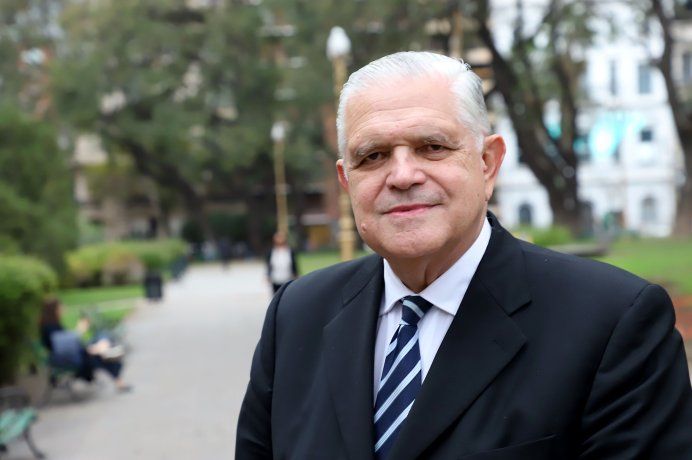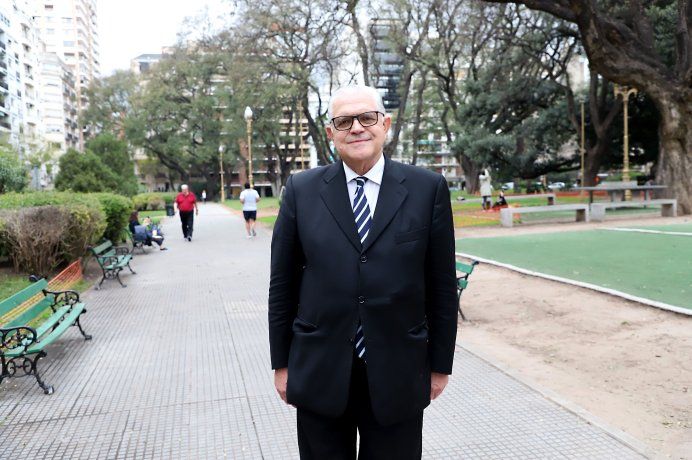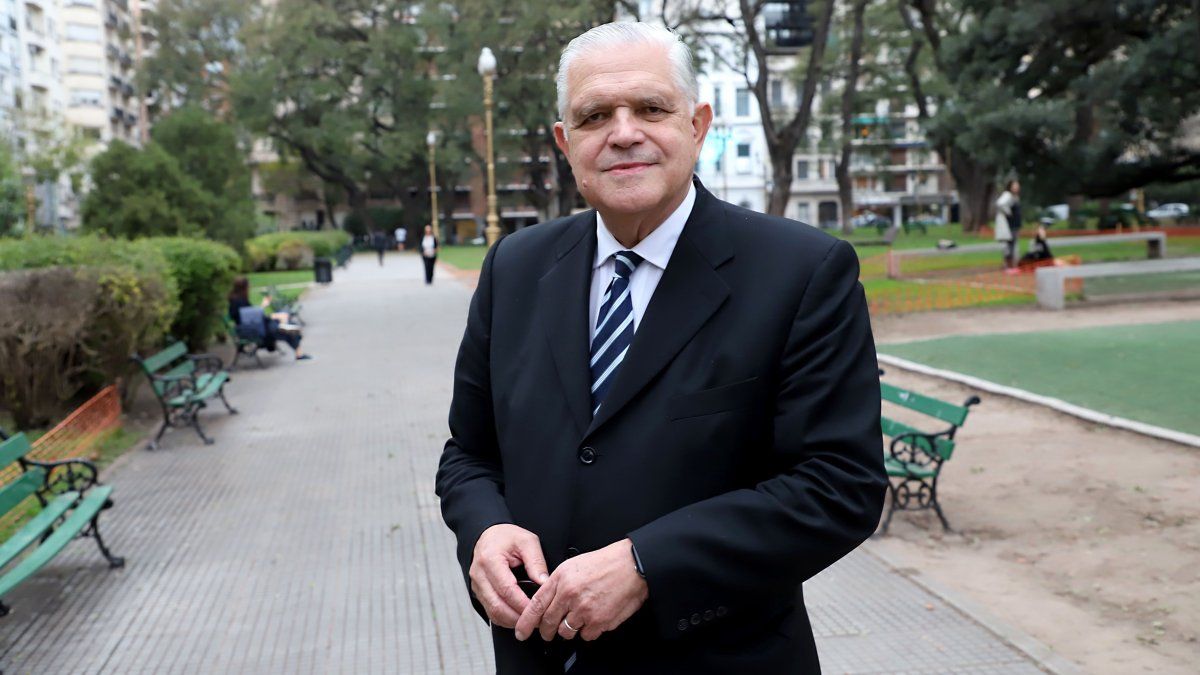Q.: He listened to former Deputy Minister of Economy, Joaquín Cottani, speaking of the economic plan …
RLM: He marked something that goes in the direction of what I say, although not with the intensity that I point out. I think there were a lot of inorganic issuance from the government. Inorganic issuance means issuance without purchase of reservations to cancel internal debt. The debt effectively went down, but that is not enough. Argentina needs slack since the beginning of the mandate.
Q.: What does that mean?
RLM: You need current account surplus, fiscal surplus, extraordinary adaptability of your labor market and a space for business and innovation. We have a fifth of the SMEs that Spain has with the same population. We here had Héctor Recalde, who has made a disaster with labor and tax legislation, and his heiress, Pilar Ramírez, who now directs the campaign of freedom advances. That is, Recalde’s right hand directs the La Libertad Avanza campaign. We are surrounded. With that scheme, this country is not viable.
Ricardo Lopez Murphy Ricardo Lopez Murphy Ricardo López Murphy
Mariano Fuchila
Q.: Why do you think that from the ruling party they choose these types of characters, then?
RLM: They abandoned them themselves. They were a neighborhood phenomenon, as I explained repeatedly. And well, if they took care of power, we were going to have the problems we had.
Q.: To calm market volatility, rather than economic resources, they will serve the governance samples, political gestures. Or not?
RLM: I believe there is a governance problem. If Kirchnerism makes a good choice, Argentina enters a desperate situation, as it did in the passage of August 11, 2019. They have not corrected anything. I believe that we are in the hands of very dangerous people and the combination of an incompetent government with a strengthened Kirchnerism would be explosive.
Q.: However, Milei said after the defeat in the province of Buenos Aires that they will make changes within their policy. How far do you think those adjustments can arrive? Can they be substantial?
RLM: Pilar Ramírez was the right hand of Recalde and then she was an official of Alberto Fernández. I don’t know whether to say infiltrated, but Kirchnerism is on one side and the other. We are surrounded. Now, if there was a triumph, I do not say that it will happen, I am realistic, but if it were overwhelming, if they massively vote to María Eugenia Talerico and Ricardo López Murphy, this fierce circle about Argentina could dissolve.
Q.: And what proposals do they present, What does this circle dissolve?
RLM: We have an integral proposal in labor, tax, federal, pension and macroeconomic. To put it in very simple terms: we aspire to a development led by exports, industry, private investment and employment, mobilizing all resources and avoiding artificiality. A model based on own effort, national autonomy, in a dramatic improvement in human capital and educational rules. We would make a comprehensive reform of education, health, rules, everything tending to build a very competitive, high performance and high employment economy.
Q.: I understand, but if now I were facing the economic team with this enclosure, what plan would have for the government to get a little more airy?
RLM: Well, this suggestion that I say: to call vote for María Eugenia Talerico and Ricardo López Murphy.
Q.: But in terms of economic measures?
RLM: That is the Revolution of Expectations. Because here the problem is not measures, they are expectations. If we are going to be in the hands of Ramírez, Recalde and Kicillof, there is nothing to do, the game is played. You have to change the idea and directly have an alternative. A triumph – I do not say that it happens, I am realistic – but a triumphant triumph of Talerico and López Murphy dissolves the macroeconomic doubts. We believe there is nothing in the nation superior to the nation itself. We will honor our credit as we honor our flag. No one would have to be afraid. We repudiate all confiscations and all defaults. They are not part of our genotype. We carry it in the bones and in the blood: fulfill the commitments.
Ricardo Lopez Murphy Ricardo Lopez Murphy Ricardo López Murphy

Mariano Fuchila
Q.: How do you explain such a strong defeat of the ruling party in the province?
RLM: We need to recreate employment, investment, education. We have a monstrous educational problem. The other day I explained it in the camera: we have many more students than Chile and Brazil, but much less graduates. In Chile, 90 of every 100 entering the university are received; Here, 20. We have inhabitants of our universities, not graduated. There is a collapse in mathematics performance. We would study the boys a lot of mathematics, almost in an Asian way. I would talk all day of mathematical problems, teach, focus there.
Q.: Considering the economic inheritance of December 2023, was there a way to carry out a program with less traumatic results for social fabric?
RLM: Yes, a program based on expanding employment, which would not have speculated with extravagant rates of interest or exchange arrears, and that would have focused on employment. I think I would have mitigated. But the country is very decapitalized: 20 years of Kirchnerism have decapitalized it. We have negative reserves, destroyed infrastructure. We have no trains, we have no energy. During Kirchnerism, having the second gas reserve, we brought gas by boat and Bolivia.
Q.: You see that the decline in poverty, that Milei highlights it as one of its main political achievements, is palpated in the street or questions the numbers offered by the government?
RLM: I believe that, in general, if the inflation rate goes down, poverty lowers, because inflation hits the poorest sectors of society. Then, if inflation goes down, poverty goes down. But I tend to think that the loss of poverty is associated with growth. Only a vigorous growth reduces it. Argentina saves net just 2% of GDP. With that level of savings you cannot grow. You have to increase it. That is why Kirchnerism’s proposals are crazy: they want to evict in a society that does not save. He has destroyed the economy in 2022 and 2023. If that returns, that “it takes us confessed,” as my grandmother said.
Q.: In this context, the government does not show a plan B and says it will continue with the same scheme. Is that a sign of strength or weakness?
RLM: I have no links or dialogue with the government, it is difficult for me to answer the question. The president had a different diagnosis: he believed that Argentina had more potential and less problems. But you have to remember that he worked with Scioli and Alberto Fernández. That explains his illusory vision about the difficulties of the country.
Q.: Did the economic team accompany that diagnosis? Or are there internal differences?
RLM: I think the bulk of the economic profession was always against. In my list is Professor Carlos Rodríguez, who expressed it publicly. They also did Broda, Melconian, Lacunza. All professional economists, from the beginning, marked a tremendous discrepancy. I remember a meeting in which Fernando Iglesias, deputy of the ruling party, with Luciano Laspina, already at the beginning of 2024 said that things were going very badly. They did not register it. This is a beaten society, which is immediately excited about the pyrotechnics of new governments, but then frustrated.
Ricardo Lopez Murphy Ricardo López Murphy

Mariano Fuchila
Q.: The possibility that the American treasure gives Argentina arises a line of credit. Under this economic model that the government raises, how much can it be?
RLM: I don’t know, I don’t seem feasible to happen, to be honest. I think that capital markets have a very negative vision. It would be necessary to go out: “We are going to rebuild the credit.” For example, I once witnessed in Uruguay that President José María Sanguinetti, being a candidate, called the other applicants and the four went out to say that they were going to honor the credit, that they were going to pay the debts with the effort of the Uruguayans. I do not see Jorge Taiana, Kicillof, to emphasize uniquely supporting the government to comply with the credit, have a surpass budget and normalize payments.
I don’t see them sincerely. If it happened, it would be a novelty. Because I don’t have deputies or senators in that number. But if Taiana, Kicillof and Recalde went out to say that they are looking for a supervital budget and complying with the debts, it would have a very large impact. That was what Sanguinetti achieved in Uruguay in the midst of a frightful crisis, and went ahead. It must be remembered that when Uruguay had the 2001-2002 crisis, he received a huge help from the American Treasury and Tabaré Vázquez decorated George Bush. Another mentality that was there.
Q.: Peronism could also understand that greater indebtedness is not the exit to this crisis situation …
RLM: The truth is that everyone believes, even within Argentina, that Peronism is trying to dismiss the government. If they said: “We are going to behave in an exemplary way and we will clean up Argentina,” it would be a very big change.
Q.: And from the other side, what gesture could the ruling have with the opposition to guarantee that commitment? It is the government itself that raises insurmountable differences.
RLM: Recognize that he was wrong from medium to medium: in the treatment of Congress, in behavior, in forms, in the proposals. There was a dramatic error of diagnosis and program. On our side, if good for us, the country knows that we are going to work well. The problem is on the other side. If Taiana, Kicillof and Recalde begin to say: “We are going to a very large surplus,” I would say: “The crisis is aborted.” Until that time, it cannot be guaranteed that the government has access to external markets to refinance the debt. A high voltage gesture is needed. That would be a very big shock.
Q.: How does a figure with extensive political career to present itself as a renovating proposal in the next elections?
RLM: I do not come from neighborhood policy. I come from academic life. My role in Argentine politics was for many architectural years, of ideas production. And actually today I am a professor and academic in two academies. Much of my personal life is dedicated to studying. Today they made me laugh because a journalist asked me what time I got up to study. I live studying. If one looks at my production in Congress, I did 375 projects throughout the spectrum. I have followed a trajectory almost with a very academic bias. Germán Martínez himself, head of the Peronism block, says he does not understand why each vote founded so much. I founded because I want history to understand what we did at all times and that the judges know what the will of the legislator was.
I have been renewing proposals within a line that has not escaped the tradition that prevailed in Europe, New Zealand, Australia, Japan in the postwar period: a mixed economy, with private initiative, open, pluralistic society, integrated into the world, with a role for the public sector and another for the market. My proposals are not so novel: they are doing what the Scandinavians, the Finns, the most successful countries in educational and labor matters do. I have looked a lot at the Dutch and Nordic norms. I am interested in building a society as cohesive as possible. Distributive problems in Argentina are due to the heterogeneity of human capital. If we want a cohesive society, we have to homogenize human capital. That implies an educational revolution. Today we have less days and class hours than the rest of the countries. We do everything backwards. That generates a very unequal society.
Source: Ambito




